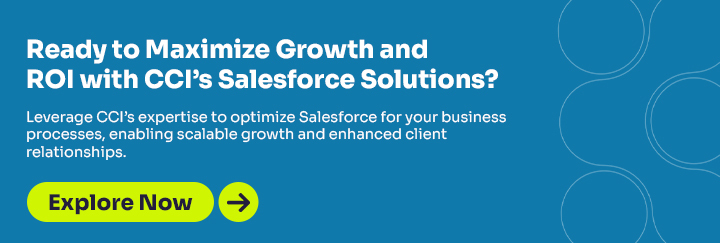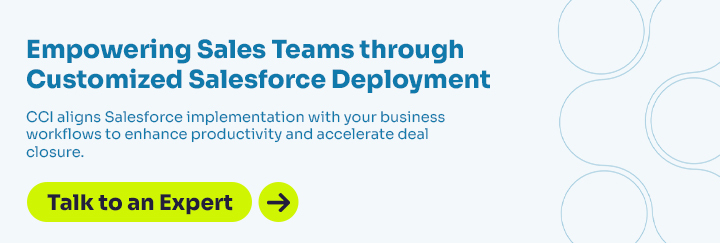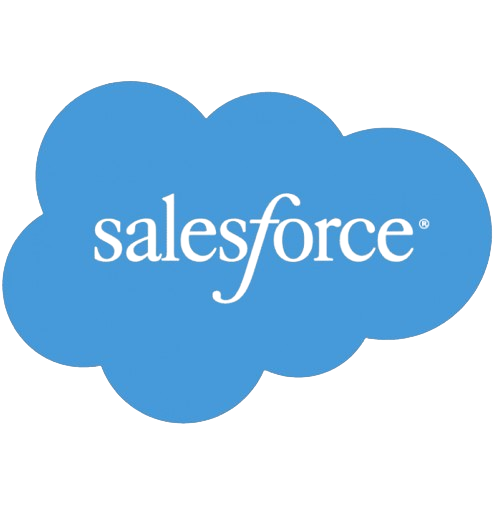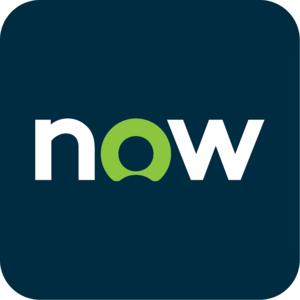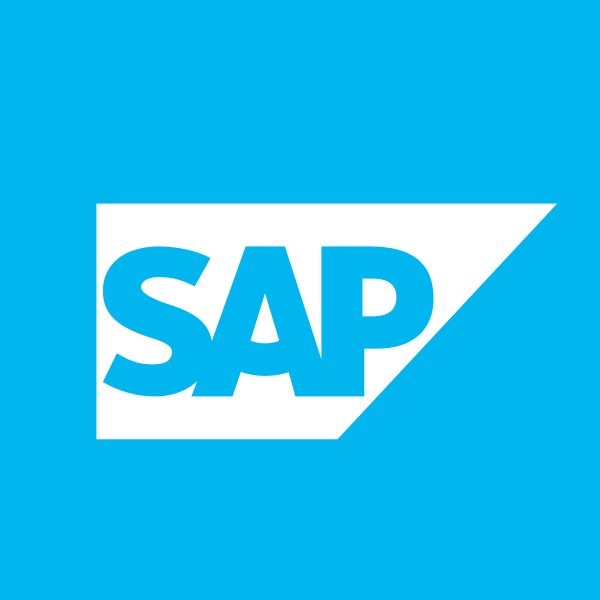Salesforce vs Zoho: Which One is Better in 2025?
Updated on February 19, 2026
Choosing the right customer relationship management (CRM) platform is pivotal for businesses aiming to streamline lead management, enhance customer relationships, and drive revenue growth in 2025. The Zoho vs Salesforce debate remains a focal point in the CRM landscape, as both platforms cater to millions of users worldwide with distinct strengths.
Salesforce, a global leader with a vast ecosystem and advanced AI capabilities, excels for enterprises needing deep customization and scalability. Zoho CRM, part of the Zoho One suite, offers affordability and simplicity, making it a go-to for small and medium-sized businesses (SMBs) seeking rapid deployment and value-packed features.
>> Related Post: Salesforce Clouds: Types, Features & Benefits [2025/2026]
What Is Salesforce CRM?
Salesforce CRM, launched in 1999, is the world’s leading cloud-based CRM platform, serving over 150,000 customers, including 85% of Fortune 500 companies. Built on the Salesforce Lightning Platform, it centralizes customer data, automates workflows, and delivers actionable insights for sales, marketing, and service teams. Its flagship product, Sales Cloud, integrates advanced features like Einstein AI for predictive analytics and Flow Builder for no-code automation, making it ideal for enterprises with complex needs.
Salesforce’s ecosystem, including 7,000+ AppExchange apps, supports extensive customization and scalability, but its complexity often requires expert implementation. For businesses seeking enterprise-grade CRM, Salesforce’s robust AI and integration capabilities provide unmatched flexibility and growth potential.
>> Related Post: Top Salesforce Experience Cloud Implementation & Consulting Companies in 2025
What Is Zoho CRM?
Zoho CRM, introduced in 2005, is a cloud-based platform within the Zoho One suite, serving over 250,000 businesses globally. Designed for affordability and simplicity, it caters to SMBs with intuitive tools for contact management, sales automation, and analytics. Zoho’s built-in AI, Zia, offers basic predictive insights and sentiment analysis, while its drag-and-drop workflow builder simplifies automation for non-technical users.
Zoho provides a free tier for up to three users and seamless integration with 40+ Zoho apps, making it a cost-effective choice for startups. Zoho’s all-in-one approach ensures SMBs can manage sales, marketing, and operations without heavy investment, though it may lack the depth of Salesforce for large-scale enterprises.
Pricing Structures: Making CRM Accessible to All
Pricing is a critical factor in the Zoho CRM vs Salesforce comparison, particularly for budget-conscious SMBs and cost-sensitive enterprises. Zoho CRM offers transparent pricing, starting with a free plan for up to three users, ideal for startups testing CRM capabilities. Paid plans range from $14/user/month (Standard) to $52/user/month (Ultimate, billed annually), with add-ons like Zia AI costing $5/user/month, per Zoho’s 2025 pricing. This affordability makes Zoho 50-70% cheaper for basic needs, appealing to Atlanta-based SMBs.
Salesforce Sales Cloud starts at $25/user/month (Starter) and scales to $500/user/month (Unlimited) with full Einstein AI features, per Salesforce’s 2025 pricing. Enterprise plans often require custom quotes, and implementation costs can range from $10,000 to $50,000 for SMBs, according to G2’s 2025 analysis. While Salesforce’s higher cost suits enterprises that need advanced AI.
>> Related Post: Top Salesforce Commerce Cloud Implementation & Consulting Companies in 2025
User-Friendly: Simplifying CRM Adoption
Ease of use is a key differentiator in Salesforce vs Zoho. Zoho CRM’s intuitive interface and drag-and-drop tools enable rapid adoption, with users reporting setup in days and a 4.3/5 ease-of-use score. Its straightforward dashboard and Zoho Creator for app development make it accessible for SMBs with limited technical expertise, ideal for startups in Atlanta.
Salesforce’s Lightning Experience, while powerful, is more complex, scoring 4.2/5 for ease of use. Its extensive customization options via AppExchange (7,000+ apps) require skilled admins or partners for optimal setup.
Salesforce CRM Tools That Foster Growth And Efficiency
Salesforce CRM offers a robust suite of tools designed to drive growth and efficiency, particularly for enterprises with complex needs. Key tools, based on Salesforce’s 2024 documentation, include:
- Einstein Lead and Opportunity Scoring: Uses AI to assign scores (1–99) to leads and opportunities, prioritizing high-potential deals and reducing manual effort.
- Flow Builder and Process Builder: No-code automation tools streamline workflows, integrating seamlessly with Sales Cloud and Service Cloud for enterprise-grade efficiency.
- Einstein GPT: Generates personalized emails and content, boosting campaign ROI, ideal for New York marketers.
- Tableau and Einstein Analytics: Provides advanced visualization and predictive forecasting, enabling data-driven decisions for London enterprises.
- Chatter and Slack Integration: Enhances team collaboration, critical for distributed teams. These tools, combined, empower businesses to scale operations and achieve measurable growth.
>> Related Post: 10 Salesforce Data Migration Tools You Should Know in 2025
Zoho CRM Tools Customized For Small And Medium-Sized Businesses
Zoho CRM’s tools are tailored for SMBs, offering simplicity and affordability without sacrificing functionality. Key tools, per Zoho’s 2025 documentation, include:
- Zia AI: Provides basic sentiment analysis and lead scoring, helping SMBs identify high-value prospects with minimal setup, suitable for Atlanta startups.
- Workflow Automation: Drag-and-drop builders support up to 10 workflows per module, automating tasks like email triggers and task assignments for efficient operations.
- Customizable Dashboards: Offers user-friendly analytics for tracking sales trends, sufficient for SMBs with simpler reporting needs.
- Zoho One Suite Integration: Seamlessly connects with 40+ apps (e.g., Zoho Books, Zoho Desk), creating an all-in-one ecosystem for small teams.
- Mobile App: Enables on-the-go access with offline capabilities, ideal for Sydney-based SMBs managing sales remotely.
Integration Capabilities
Integration capabilities are a critical aspect of Zoho vs Salesforce. Zoho CRM integrates seamlessly with the Zoho One suite (40+ apps, including Zoho Books for accounting) and 500+ third-party apps via Zapier, making it ideal for SMBs seeking an all-in-one ecosystem. Its pre-built connectors simplify integrations for small teams, per Zoho’s 2024 integration docs.
Salesforce’s AppExchange offers 7,000+ apps, including MuleSoft for advanced ERP integrations (e.g., SAP, Oracle), providing unmatched flexibility for enterprises, as noted in Forrester’s 2024 CRM Wave. For London firms needing complex integrations, Salesforce excels.
Scalability
Scalability is a key consideration in Salesforce vs Zoho. Zoho CRM scales well for SMBs up to 100 users, offering unlimited storage in higher plans and supporting growing teams with minimal complexity, per Zoho’s 2025 specs. It’s ideal for startups planning moderate growth, but may lag for global enterprises with millions of records.
Salesforce excels in scalability, handling millions of records and supporting complex, multi-national operations with its Lightning Platform and Data Cloud.
Customer Support and Training Resources
Customer support and training are vital for CRM adoption. Zoho offers 24/7 chat and email support for paid users, with a robust knowledge base and Zoho Academy for self-paced learning. Its support is user-friendly for SMBs but lacks the depth of enterprise-grade assistance.
Salesforce provides 24/7 phone, chat, and email support, with premium options for enterprise clients and a vast partner network. Its Trailhead platform offers interactive training.
Data Security and Compliance
Data security and compliance are critical in Zoho CRM vs Salesforce. Zoho CRM complies with GDPR, ISO 27001, and SOC 2, offering encryption and role-based access for secure data handling, suitable for SMBs in regulated markets.
Salesforce’s Einstein Trust Layer ensures GDPR, CCPA, and HIPAA compliance, preventing sensitive data from entering large language models, reducing regulatory risks, per Salesforce’s 2024 documentation. Its robust security features are ideal for London enterprises in finance or healthcare. CCI’s compliance expertise enhances both platforms, ensuring secure, compliant deployments with Integrow.
>> Related Post: Top 5 Salesforce Best Practices to Boost Your CRM Efficiency in 2025
Pros and Cons of Salesforce CRM and Zoho CRM
Salesforce CRM
- Pros:
- Advanced AI (Einstein GPT) for predictive analytics and personalization, boosting ROI.
- Scalable for enterprises with millions of records, per Salesforce’s 2024 data.
- 7,000+ AppExchange apps for extensive integrations.
- Robust support with 24/7 phone and Trailhead training.
- Cons:
- Higher cost ($25-$500/user/month) and complex setup, requiring partners. Steeper learning curve (4.2/5 ease of use on G2).
Zoho CRM
- Pros:
- Affordable pricing ($0-$52/user/month), ideal for SMBs.
- Intuitive interface (4.3/5 on G2) with quick setup.
- Zoho One suite for all-in-one functionality.
- Free tier for up to three users.
- Cons:
- Limited AI capabilities compared to Salesforce’s Einstein.
- Less scalable for large enterprises with complex needs.
>> Related Post: Salesforce Agentforce and AI: Trends & Industries to Watch in 2025
Salesforce Services Offered By CCI:
At Cloud Consulting Inc., we are committed to helping your business succeed with Salesforce. Our comprehensive suite of Salesforce services includes:
FAQs
- How does Zoho vs Salesforce pricing compare for SMBs in 2025?
Zoho vs Salesforce pricing favors Zoho’s free tier and $14-$52/user/month plans vs Salesforce’s $25-$500/user/month. - Which is better in Zoho CRM vs Salesforce for integrations?
Zoho CRM vs Salesforce integrations favor Salesforce’s 7,000+ AppExchange apps over Zoho’s 500+ Zapier connections, per Forrester’s 2024 CRM Wave, for London firms. - Is Zoho vs Salesforce better for enterprises in 2025?
Zoho vs Salesforce leans toward Salesforce for enterprises with advanced AI and scalability, while Zoho suits SMBs, per Deloitte’s 2025 CRM Trends. - What are the Salesforce vs Zoho AI capabilities?
Salesforce vs Zoho AI features highlight Salesforce’s Einstein GPT for generative content vs Zoho’s Zia for basic scoring, per Salesforce’s 2024 Marketing Trends report. - How do Zoho CRM and Salesforce support mobile use?
Zoho CRM vs Salesforce mobile apps are robust, but Zoho’s offline capabilities edge out for SMBs, while Salesforce excels for enterprise teams, per G2’s 2025 reviews. - Which is more scalable in Zoho vs Salesforce?
Zoho vs Salesforce scalability favors Salesforce for handling millions of records vs Zoho’s mid-market focus, ideal for New York enterprises, per Deloitte’s 2025 data. - Is Zoho CRM vs Salesforce a clear choice for startups?
Zoho CRM vs Salesforce favors Zoho’s free plan and simplicity for Atlanta startups, while Salesforce’s tools suit scaling businesses, per G2’s 2025 reviews. - How can CCI help with Zoho vs Salesforce decisions?
CCI offers free audits for Zoho vs Salesforce, for ERP connectivity to ensure the right CRM fit for businesses in Atlanta, London, and Sydney.
